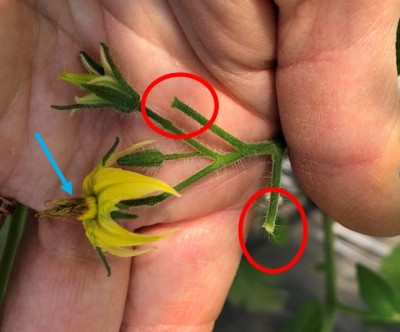Blossom Blast and Bumblebees
Amy Ivy, Vegetable Specialist
Eastern New York Commercial Horticulture
There are a variety of reasons why blossoms might blast on tomatoes. Blast is a dramatic term for when the blossoms die and fall off before fruit can set. Temperatures over 95, manganese and zinc deficiencies, and pepMV virus are all possible causes. Some plants even do some self-thinning and shed blossoms when their fruit load is too great. But this week was the first time I had heard of the concept of over-pollination, and it seems several growers are having trouble with this in their early, heated high tunnel tomatoes.
Bumblebees are ‘buzz pollinators,' meaning they shake the pollen out of the anthers by buzzing. They bite onto the anthers and then vibrate their bodies to shake loose the pollen. For an amazing video clip of how this works visit: https://www.youtube.com/watch?v=SZrTndD1H10 . Growers with heated tunnels can start their tomatoes extra early but they need to buy in bumble bees to pollinate since the native ones are not yet active.
Usually this process works fine but sometimes there are more bees than flowers and the hungry bees come back to the same flower multiple times, trying to shake more pollen loose. Too much of this aggressive feeding can kill the flowers (see photos).
One grower estimates he has lost half of all of his first flower clusters, a loss of about $2400, so this damage can be serious. The bee supplier has renamed its product line this year and most of our growers are ordering the ‘start-up' hive. But this hive was developed for high volume hydroponic producers in mind and has more bees than usual. I visited three growers with this problem this week and we would be very interested to know how many others are having this problem. Please call, text or email me (adi2@cornell.edu or 518-570-5991).
Photo: Notice the darkened anthers (blue arrows) and the dropped blossoms (red circles). A little bit of darkening is tolerable but the flowers will drop if this much damage occurs.
This article is from the April 26, 2018 edition of ENYCHP Vegetable News. To read the full newsletter, CLICK HERE.


Upcoming Events
2026 Cornell Winter Fruit Webinar Series
January 22, 2026 : Blueberry Pruning and Soil Health to Minimize Pests and Maximize Yield
Week 1: Blueberry Pruning and Soil Health to Minimize Pests and Maximize Yield
January 29, 2026 : Cost of Production for Fruit Crops
Week 2: Cost of Production for Fruit Crops - A new tool for tree fruit, updates on berry production in NY, and strategies for tracking and using expense data
February 12, 2026 : Fire Blight Management Updates
Week 3: Fire Blight Management Updates - Pathogen Biology, Defense Inducers, Biopesticides, and Pruning Therapies
February 19, 2026 : Pink and Petal Fall Insecticides- Can We Strike the Right Balance?
Week 4: Pink and Petal Fall Insecticides - Can We Strike the Right Balance?
March 12, 2026 : Inoculating Orchards with Mycorrhizal Fungi
Week 5: Inoculating Orchards with Mycorrhizal Fungi
March 19, 2026 : St. Peachtrick's Day - Cherry Pruning Strategies and Plum Varieties for the Northeast
Week 6: St. Peachtrick's Day - Cherry Pruning Strategies and Plum Varieties for the Northeast
2026 Northeast Extension Fruit Consortium Winter Webinar Series
February 4, 2026 : Management of Up and Coming Strawberry Diseases in the Northeastern United States
Session 1: Management of Up and Coming Strawberry Diseases in the Northeastern United States
February 11, 2026 : Kiwiberry Production in the Northeast
Session 2: Kiwiberry Production in the Northeast
February 18, 2026 : Heat Mitigation- Sunburn and Fruit Coloring
Session 3: Heat Mitigation- Sunburn and Fruit Coloring
February 25, 2026 : The Dating Game- Updates in Lepidopteran Mating Disruption
Session 4: The Dating Game- Updates in Lepidopteran Mating Disruption
March 4, 2026 : USEPA Endangered Species Act Strategies and Pesticide Use
Session 5: USEPA Endangered Species Act Strategies and Pesticide Use
March 11, 2026 : Practical Drought Management for Fruit Growers
Session 6: Practical Drought Management for Fruit Growers
How to Diversify or Scale Up with Confidence for Profitability - Inspired by Annie's Project
February 4, 2026
February 11, 2026
February 25, 2026
Do you have an idea for a new enterprise to add value to your farm? Maybe you're considering scaling up for a potential market opportunity but just aren't sure if it's a good fit for your business. Join Cornell Cooperative Extensions of Allegany County, Broome County, Madison County, Onondaga County, Niagara County, Tioga County, the Niagara Small Business Development Center, and the Eastern NY Commercial Horticulture Team for a hybrid series on Wednesdays in February, starting on February 4th that will answer these questions and more. Annie's Project seeks to empower farm women through education, networks and resources. We welcome, and encourage, learning and sharing amongst farm women as we help you grow as decision-makers and leaders on your farm.












































